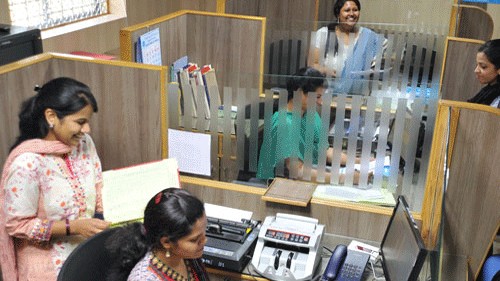
Women candidates having 0-3 years and 3-7 years of experience constitute 20-25 per cent of the total hires in their respective bands. (Representative image)
Credit: DH File Photo
Mumbai: The women workforce demographics in India suggests that of the total population of approximately 69.2 crores of women, around 37 per cent are actively working or employed, says a report.
According to talent solutions provider Careernet's The State of Women's Employment in India report, cities like Hyderabad, Pune, and Chennai top the chart in women employment.
In 2023, women's representation in the workforce experienced a significant rise of 2-5 per cent compared to the previous year, in junior professional roles and executive boards, it stated.
The report revealed 40 per cent of the fresh talent from colleges placed in 2023 were women.
Women candidates having 0-3 years and 3-7 years of experience constitute 20-25 per cent of the total hires in their respective bands, it added.
The report further revealed that there has been a slight overall increase in the hiring ratio of women in most cities, except for Delhi and National Capital Region (NCR), which showed a decline.
Hyderabad leads with a 34 per cent hiring rate, followed by Pune at 33 per cent, and Chennai at 29 per cent. While, Delhi-NCR has witnessed a decline at 20 per cent, reflecting a 2 per cent decrease from the 2022 figure, it added.
The report has been prepared with an analysis of 25,000 job placements collated from internal sources, employer career portals, and month-on-month hiring trends in 2023.
The sectoral analysis revealed an increase in hiring trends for women in the banking, financial services and insurance (BFSI) sector within Global Capability Centers (GCCs), the offshore units set up by multinational companies to perform a range of strategic functions.
Further, the report noted a narrowing pay gap, decreasing to approximately 20 per cent in 2023 from 30 per cent in the previous year, signalling a positive shift towards equitable salary practices.
Meanwhile, the hiring of women at the mid-management level has remained unchanged at 23 per cent over the past two years, said the report.
"... While 30 per cent of the urban population are white-collar professionals, only 5 per cent of the rural populace falls into this category. This underscores a significant gender disparity in India's white-collar landscape," Careernet CEO and co-founder Anshuman Das said.
While significant strides have been made in enhancing women's participation in the Indian workforce, some challenges need addressing for them re-entering the workforce, he said.
"The surge in women's employment in the Indian startup ecosystem affirms that India Inc is open to transformation," he added.